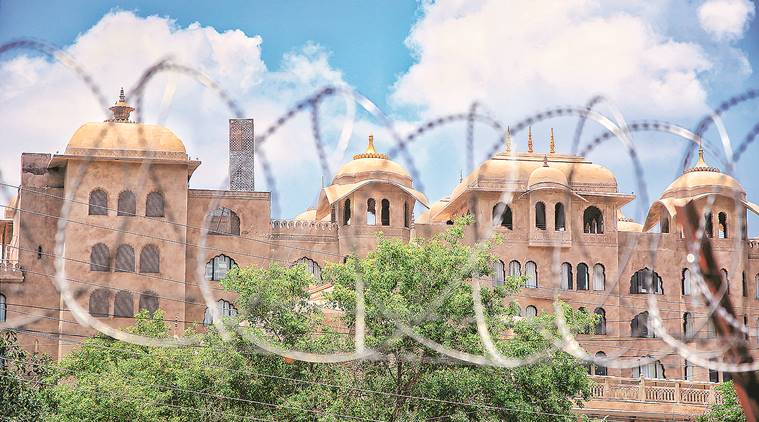 Fairmont Hotel in Jaipur. Holed up there, Gehlot, loyalists held a ‘Save Democracy, Save Constitution’ protest Monday. (PTI)
Fairmont Hotel in Jaipur. Holed up there, Gehlot, loyalists held a ‘Save Democracy, Save Constitution’ protest Monday. (PTI)
WHILE HE returned the Ashok Gehlot government’s recommendation for an Assembly session from July 31 — the second time in five days — Rajasthan Governor Kalraj Mishra said on Monday that “if the government wants to seek a trust vote, then this can be a reasonable basis for calling a session on short notice”.
But, he said, while the Gehlot government’s comments, as reported in print and electronic media, make it clear that it wants a trust vote, it hasn’t mentioned this in its recommendation for an Assembly session. Citing the Covid pandemic, Mishra also said that a session cannot be called “without any special urgency”.
Saying that “Raj Bhavan has no intention of not calling an Assembly session”, Mishra, according to a statement released by his office, asked the government to act on three points and send a fresh proposal addressing these:
Reiterating his earlier statement, he said “a clear 21-day notice” should be given for calling an Assembly session. He also pointed out that a healthy debate on important social and political issues can be held online.
Mishra also issued directions in case of a trust vote: it should be conducted in the presence of the principal secretary of the parliamentary affairs department, be decided only through ‘yes’ and ‘no’ buttons, telecast live, and recorded on video.
Citing the Covid pandemic, Mishra said: “It is the constitutional responsibility of the Governor, that in such adverse circumstances, without any special urgency, (why should) an Assembly session be called and the lives of 1,200 persons (including 1,000 employees) be put at risk.”
“From what I know, there is no seating plan to accommodate all the 200 MLAs while maintaining social distancing, while, to check spread of infection, it is necessary to follow the Disaster Management Act and directions by the government,” he said.
Meanwhile, addressing a ‘Save Democracy, Save Constitution’ meeting at Fairmont Hotel, where the Congress is keeping its MLAs, Gehlot said he had received a “six-page love letter” from the Governor and his government would respond by evening.
He said this was the first time that such questions were being raised, adding that Assembly sessions have been called with just 2-3 days notice in the past. He said he had also spoken to Prime Minister Narendra Modi regarding the Governor’s conduct.
At the meeting, the party’s Rajasthan in-charge Avinash Pande also read out a letter sent to President Ram Nath Kovind. The letter, sent by CLP members and other MLAs supporting the Gehlot government, says that Governors in several states are violating the Constitution on instructions from the ruling party. It asks the President to intervene and stop the “undemocratic attempts to weaken democracy across the country, including in Rajasthan”. It also seeks his intervention in calling an Assembly session.
After the Governor did not call an Assembly session following a cabinet recommendation on July 23, Gehlot had mounted an offensive against him, saying he was giving in to “pressure from above”. Congress MLAs sat on a protest inside Raj Bhavan, but later called off their protest after an “assurance” by the Governor, who sought the government’s response on six points. A fresh recommendation was then sent to the Governor on July 25.
Sources said Raj Bhavan was particularly unhappy with the government saying, in its recommendation sent on July 25, that as per Article 174 of the Constitution, the Governor is “bound” to follow the cabinet’s recommendation and cannot take a decision as per his own “vivek” (discretion).
The government also cited the 2016 Nabam Rebia and Bamang Felix versus Deputy Speaker, Arunachal Legislative Assembly case to say that the Governor cannot use his discretion to call an Assembly session.
Mishra has said that while under Article 174 (1), the Governor will indeed act as per the cabinet’s recommendation under normal circumstances, “but if the circumstances are special, the Governor will ensure that an Assembly session is called as per the spirit of Constitution”, wherein it shall be ensured that apt time and appropriate protection is extended to all the MLAs, apart from their “independence” and “free movement.”